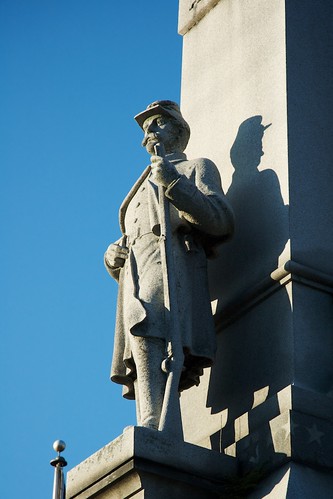
© 2009 Simon Hucko
Ever take a shot, looked at the LCD review, and thought "good enough, I'll fix it in post." Sure you have. We all have. It's so easy to tweak an image to where you want it, why not fix everything in Photoshop?
Photographers who learned to shoot on film complain that digital has made people lazy. While I'm all about the power and flexibility of shooting digital, I do think that they have a point. If you're constantly having to adjust your exposure or composition (either by extensive cropping or by cloning out distracting backgrounds), it's time to slow down, get back to basics, and pay more attention while you're shooting. Sure, these are easy fixes, but they also degrade the quality of your image, and often the time you spend tweaking each image is much longer than the time it would have taken to get it right in the first place.
That having been said, sometimes you have no choice. Take today's image. See the original below:

There was no physical way I could frame this shot without that distracting flagpole sneaking into the frame. Rather than give up and not take the shot, I thought "I'll fix it in post" and fired away. A little bit of cloning and I got a very nice shot of a statue against the clear blue sky. I also cropped it in a bit to remove some distracting parts of the statue. This should have been done in camera, but lens wasn't long enough.
What are your thoughts? When (if ever) is counting on fixing things in post ok?
~S
[title of blog] on flickr
![[title of blog]](https://blogger.googleusercontent.com/img/b/R29vZ2xl/AVvXsEhJ8bvx_9_zOAREbXcrJRML7aVvJMbb90IYYYuyti384jeZHYQ9t8MK6_Kpt_1P4-pZw-QfF9kh4Sqci0vbopzLme862PPhuyPJcc7pRLUW1K1aNzts5YzuXIhgonq66MpjJCqfiWtfwUw/s1600-r/waterfall.png)




LOL well you know me, I'm ALL about post. :P
ReplyDeleteNo j/k. But yeah I'm a little bit of a lazy photographer in the sense that if a shot is 90% of the way there, I won't re-shoot, I'll just flag it to fix in Photoshop.
However, I am NOT a lazy photographer in the sense that, if the best angle is from the other side of the hill, goshdarnit I WILL climb over there and get it. Or if an animal/small child is moving like crazy, I will take 90 billion shots to get a few good ones.
For the most part, I try to get the shot I want when I'm shooting, but if I know it's going to be easier/quicker to fix a little something in post, and/or I don't notice until I get back to the computer (because let's face it, there isn't always time to check your shots), then so be it.
Being an 'old school' photog - raised on silver halide and schooled by many hours in the darkroom, I'm a big fan of shooting it right the first time. Because it was so expensive (both time and money) to fix it in post, and "post" had huge limitations on what you could actually "fix" - it behooved us old timers to get it right the first time. In one composition class, my photo instructor made us print all of our shots full-frame, w/no cropping. We were required to use special filed-out negative holders in the enlarger that would include the film sprocket holes on the print.(negative holders?? - enlarger?? - sprocket holes?? whatthehell is the old guy talking about???) Printing sprocket holes proved you didn't crop the image - and also proved (or disproved) the accuracy of your exposure and film development technique. By comparing the black of the "clear" sprocket hole with the black produced by the clear film base, and the darkest black on the print, one could decode if the neg had been over/under exposed and/or over/under developed. blah blah blah Shooting and printing that way (and getting graded on it) drove us to become more disciplined in origination: composition and exposure. The GREAT thing about digital is that you can grade yourself immediately after you shoot, while you still have the ability (usually) to take a few more shots, change the exposure and alter the composition. In the old days, after we fought our way past the pteradactyls and got into the lab - it was much too late.
ReplyDeleteSO - my recommendation? Just for yucks, shoot your next series or two with the thought that you can't 'fix it in post'. Take some extra time to compose and think about your exposures. Shoot 'em and then pop them up on the screen and really scrutinize them before doing any tweaking. Ask yourself what grade would you get from your professor if you had to turn in the unadulturated image?
@Kristan - True, it's hard to see everything on a 2" LCD screen. I often find things when I load an image on my monitor that I totally missed at the time.
ReplyDelete@Dad - Thanks for the "old school" musings ;) I remember you telling me that story, and that's part of the inspiration for this post. I agree 100% with your recommendation - taking time to get it right in camera is a great exercise, and something that I strive for in my photos.